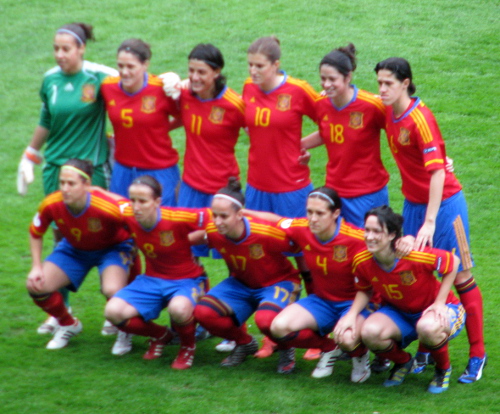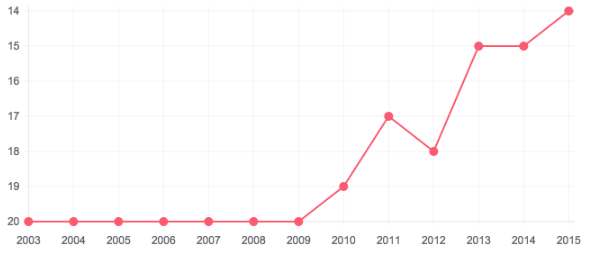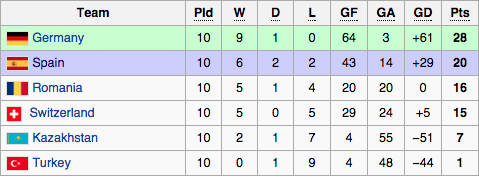By Danielle Lazarus
Return to the Main Players to Watch Page
The Spanish National Team in 2012 (a)
Unlike the world-famous Spanish Men’s National Team, their female counterparts have found little success on an international level. However, much of this slow progress is no fault of the women’s team, but instead systemically due to Spain as a country: women’s soccer was illegal during dictator Francisco Franco’s regime from 1939 until 1975, and viewed as “unsuitable” by the Royal Spanish Football Federation (RFEF) (1). In the early 1970s, underground women’s soccer teams formed the first unofficial Spanish National Team, which was invited to take part in the second unofficial World Cup but banned to participate by RFEF (1). After Spain transitioned to a democracy, RFEF finally recognized the national team in 1980, and it made its debut in 1983 (1).
Due to this stunted progress, Spain has failed to qualify for a World Cup since the inception of its national team—until 2015 (1). However, the team remains embroiled in controversy, with many of Spain’s top players choosing to forgo their spot on the national team because of claims that the RFEF continues to ignore the women’s team and give it proper resources to develop. Specifically, head coach Ignacio Quereda has been in his position since 1988, the longest-tenured coach in the 2015 World Cup, despite many disagreements with top Spanish players (2). In 2011, Spain’s top scorer Laura del Rio, who had scored 40 goals in 39 national team appearances, left the national team along with other players due to a dispute with Quereda:
Being part of the team was a dream come true. Unfortunately things didn’t work out with Ingnacio Quereda, the manager of the team. He’s been with the team for over 28 years. We don’t see eye to eye on many things. I’m not the only one who is no longer part of the team due to this. There are many. [The only way I would go back is] for Quereda to leave the team. (3)
However, recently Quereda has led his squad to the most success it’s ever had, leading up to what appears to be a promising 2015 World Cup.
Trend of Spain’s world rankings since 2003, from FIFA (4)
Recent Tournaments
2013 UEFA Women’s European Championship (5)
Before 2013, Spain had only qualified for one major tournament in team history: the 1997 UEFA Women’s European Championship (also known as the Women’s Euro), where they finished in third place. In 2013, Spain qualified again for the Euro, beating out 43 other European teams for the 11 available spots. Spain went 6-2-2 in its group, losing to Germany and Switzerland while drawing against Germany and Romania. Dominating in many of its victories, forward María Paz set a Women’s Euro record in Spain’s 13-0 victory over Kazakhstan with seven goals during the match.
Group 2 standings from 2013 Euro qualifying, from Wikipedia
Because Spain placed second in its group, it was forced to take part in playoff against Scotland, with the team with the highest aggregate score between the two advancing after two matches. After a 1-1 draw in the first match, Spain turned out a dramatic 3-2 victory to advance, with captain Verónica Boquete scoring Spain’s winning goal in the 122nd minute with the last kick of the game (featuring some incredible commentating):
Boquete’s last-second goal against Scotland, from Mr GD66
Unfortunately, Spain’s success would be short lasting: although they qualified for the knockout stage, they failed to advance past eventual runners-up Norway in the quarterfinals.
World Cup Qualifying (6)
European teams participated in a series of round-robin home-and-home games to qualify for the 2015 World Cup, over 10 matches between October 2013 and September 2014. Spain was drawn into Group 2, along with Italy, Czech Republic, Estonia, Romania, and Macedonia, tallying a 9-1 record and a +40 goal differential to win the group and advance to the World Cup. Its largest margin of victory came against Macedonia, in a 12-0 win that saw forward Natalia score five goals:
Highlights from Spain’s victory over Macedonia, from Ah Ahly Women’s
Group 2’s standings from the World Cup qualifying tournament, from Wikipedia
Player to Watch at the 2015 World Cup
Veronica “Vero” Boquete
The captain of the Spanish National Team and its top goal-scorer, Vero is considered one of the best attacking midfielders in the world. On a club level, Vero has found success around the globe, in her native Spain, Russia, Germany, and the United States. Vero was born in Santiago de Compostela, Galicia, a small town that had no girl’s soccer when she was growing up (7). She joined a boy’s team as a result, but wasn’t allowed to play in games for a year. Once she got on the field, however, she received major backlash from her neighbors, recalling:
In Spain, football is the king sport. I remember I spent all my free time—if I were in school, the most important part was when we were outside and we just played. After the [school] day, we’d just stay there and play football. And then you go home and you are on the street playing football. [But] during all those years [playing on the all-boys team], I had to hear too many [negative] comments (8).
Her upbringing has paid off, because Vero has made a name for herself internationally, especially since playing in the United States. As a member of the Philadelphia Independence in 2011, Vero earned Women’s Professional Soccer’s Player of the Year Award; the next year, she led Swedish club Tyreso FF to their first Damallsvenskan championship. Vero just wrapped up a season with the Portland Thorns FC in the United States’ National Women’s Soccer League and is currently playing for Frankfurt, which she led to the finals of the Champion’s League (the championship game will take place on May 14th, 2015) (7). Thanks to her 2014 performance on the pitch, Vero is currently nominated for the BBC Women Footballer of the Year Award.
Vero’s top moments from 2014, from JigsawWill
Vero looks to continue her hot streak in the World Cup, after scoring 12 goals for Spain in the 2013 Euro, adding to her tally of 29 overall. Off the pitch, since rising to fame internationally, Vero has not forgotten her roots, and has become a champion in advocating for the inclusion and exposure of women’s soccer, especially in Spain. Arguably getting more attention than her performance in clubs around the world was her viral petition on Change.org, asking for the addition of women’s soccer players to EA Sports’ FIFA video games (translated from Spanish):
We can do much to advance equality through sports.I want to contribute to this request, so I ask EA Sports to contribute to equality in sports and include female players in their game FIFA. It seems silly but it is not. Including players in FIFA would encourage girls who, like me, love football, to develop their passions, to compete to follow their dreams, and normalize the relationship between women and sport, because the kids who play now will be the adults of society tomorrow. Let soccer help break barriers (9).
Vero’s versatility, experience, and leadership on and off the field is the perfect mix for her to lead Spain’s new renaissance of women’s football—perhaps even braking some barriers in the meanwhile.
Return to the Main Players to Watch Page
Works Cited
(1) “Spain Women’s National Football Team.” Wikipedia. Wikimedia Foundation. Accessed on 28 Apr. 2015. <http://en.wikipedia.org/wiki/Spain_women%27s_national_football_team>.
(2) “2013 UEFA European Women’s Championship Match Press Kit.” UEFA.org. Accessed on 28 Apr. 2015. <http://www.uefa.org/printoutfiles/competitions/woco/2013/E/E_2010717_pk.pdf>.
(3) Enriquez, Nell. “Laura Del Rio Enjoying New Found Freedom.” Equalizer Soccer. 18 May 2011. Accessed on 28 Apr. 2015. <http://equalizersoccer.com/2011/05/18/laura-del-rio-enjoying-new-found-freedom/>.
(4)”The FIFA/Coca-Cola World Ranking – Associations – Spain – Women’s – FIFA.com.” FIFA.com. Accessed on Web. 28 Apr. 2015. <http://www.fifa.com/fifa-world-ranking/associations/association=esp/women/index.html>.
(5) “UEFA Women’s Euro 2013.” Wikipedia. Wikimedia Foundation. Accessed 28 Apr. 2015. <http://en.wikipedia.org/wiki/UEFA_Women%27s_Euro_2013>.
(6) “2015 FIFA Women’s World Cup Qualification (UEFA).” Wikipedia. Wikimedia Foundation. Accessed on 28 Apr. 2015. <http://en.wikipedia.org/wiki/2015_FIFA_Women%27s_World_Cup_qualification_(UEFA)>.
(7) “Verónica Boquete.” Wikipedia. Wikimedia Foundation. Accessed on 28 Apr. 2015. <http://en.wikipedia.org/wiki/Ver%C3%B3nica_Boquete>.
(8) Hayes, Graham. “Boquete Might Be NWSL’s Best Player.” ESPN. 1 Aug. 2014. Accessed on 28 Apr. 2015. <http://espn.go.com/espnw/news-commentary/article/11296309/espnw-portland-thorns-fc-veronica-boquete-nwsl-best-player>.
(9) “EA Sports: Incluyan Jugadoras En Su Videojuego De Fútbol FIFA.” Change.org. Accessed on 28 Apr. 2015. <https://www.change.org/p/ea-sports-incluyan-jugadoras-en-su-videojuego-de-f%C3%BAtbol-fifa>.
Images
(a) http://upload.wikimedia.org/wikipedia/commons/7/78/Spanische_Nationalmannschaft.JPG
(b) http://upload.wikimedia.org/wikipedia/commons/8/8c/Ignacio_Quereda.JPG
(c) http://upload.wikimedia.org/wikipedia/commons/0/07/Vero_Boquete_Euro_2013b.jpg
How to cite this article: “Spanish Women’s National Team” Written by Danielle Lazarus (2015), World Cup 2015, Soccer Politics Blog, Duke University, http://sites.duke.edu/wcwp/world-cup-guides/world-cup-2015-guide/players-to-watch-at-the-2015-womens-world-cup/spain-english/ (accessed on (date)).







Pingback: 5 Latina National Teams You Need to Know About - Girls Soccer Network
Pingback: Who are the 2015 Women's World Cup coaches in Group E? - Dear Sports Fan